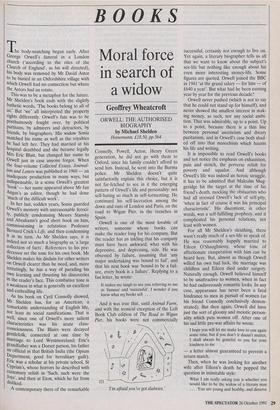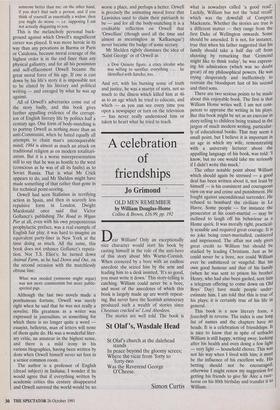BOOKS
Moral force in search of a widow
Geoffrey Wheatcroft
ORWELL: THE AUTHORISED BIOGRAPHY by Michael Shelden Heinemann, £1 8.50, pp.564
he body-snatching began early. After George Orwell's funeral in a London church (`according to the rites of the Church of England', as his will directed), his body was removed by Mr David Astor to be buried in an Oxfordshire village with which Orwell had no connection but where the Astors had an estate.
This was to be a metaphor for the future. Mr Shelden's book ends with the slightly bathetic words, 'The books belong to all of us.' But 'we' all interpreted the property rights differently. Orwell's fate was to be posthumously fought over, by political partisans, by admirers and detractors, by friends, by biographers. His widow Sonia snatched his name as well as the royalties he had left her. They had married at his hospital deathbed and she became legally Mrs Eric Blair, but changed her name to Orwell just in case anyone forgot. When the four-volume Collected Essays, Journal- ism and Letters was published in 1968 — an inadequate production in many ways, but indispensable, in a sense Orwell's greatest `book' — her name appeared above Mr Ian Angus's as editor, though he had done much of the difficult work'.
In her last, sodden years, Sonia guarded Orwell's memory with unreasonable feroci- ty, publicly condemning Messrs Stansky and Abrahams's good short book on him, commissioning in refutation Professor Bernard Crick's Life, and then condemning it in its turn. As Mr Shelden says, it is Indeed not so much a biography as 'a large collection of facts'. References to his pre- decessor set the tone for his own book. Mr Shelden makes his disdain for other writers 911 Orwell clearer than he need, and, more irritatingly, he has a way of parading his Own learning and thrusting his discoveries In the reader's face. This combative tone is a weakness in what is generally an excellent and enthralling life.
As his book on Cyril Connolly showed, Mr Shelden has, for an American, a remarkable understanding of English life, not least its social ramifications. That is well, since one of Orwell's more salient characteristics was his acute class- Consciousness. The Blairs were decayed gentlefolk, connected at one time by marriage to Lord Westmoreland; Eric's grandfather was a Dorset parson, his father an official in that British India (the Opium Department, good for hereditary guilt). Eric was a scholar at his private school, St Cyprian's, whose horrors he described with Customary relish in 'Such, such were the JoYs', and then at. Eton, which he far from disliked.
A contemporary there of the remarkable Connolly, Powell, Acton, Henry Green generation, he did not go with them to Oxford, since his family couldn't afford to send him. Instead, he went into the Burma police. Mr Shelden doesn't quite satisfactorily explain this choice, but it is not far-fetched to see in it the emerging pattern of Orwell's life and personality: not self-hating so much as self-tormenting. He continued his self-laceration among the down and outs of London and Paris, on the road to Wigan Pier, in the trenches in Spain.
Orwell is one of the most lovable of writers, someone whose books can make the reader long for his company. But the reader has an inkling that his company must have been awkward, what with his depressive, and depressing, side. He was obsessed by failure, assuming that 'any major undertaking was bound to fail', and that his next book was 'bound to be a fail- ure, every book is a failure'. Replying to a fan letter, he wrote:
It makes me laugh to see you referring to me as 'famous' and 'successful'. I wonder if you know what my books sell . .
And it was true that, until Animal Farm, and with the ironical exception of the Left Book Club edition of The Road to Wigan Pier, his books were not commercially
'I'm afraid you've got diabetes.' successful, certainly not enough to live on. Yet again, a literary biographer tells us all that we want to know about the subject's sex-life but nothing like enough about his even more interesting money-life. Some figures are quoted. Orwell joined the BBC in 1941 'at the grand salary — for him — of £640 a year'. But what had he been earning year by year for the previous decade?
Orwell never pushed (which is not to say that he could not stand up for himself), and never showed the smallest interest in mak- ing money, as such, nor any social ambi- tion. That was admirable, up to a point. Up to a point, because there is a thin line between personal asceticism and dreary puritanism, and in Orwell's case both shad- ed off into that masochism which haunts his life and writing.
It is impossible to read Orwell's books and not notice the emphasis on exhaustion, pain and stench, the perverse relish for poverty and squalor. And although Orwell's life was indeed an heroic struggle, it has to be admitted that Malcolm Mug- geridge hit the target at the time of his friend's death, mocking the obituarists who had all stressed Orwell's lack of self-pity, `when in fact of course it was his principal characteristic'. His discontent, in other words, was a self-fulfilling prophecy, and it complicated his personal relations, not least with women.
For all Mr Shelden's sleuthing, there wasn't really much of a sex-life to speak of. He was reasonably happily married to Eileen O'Shaughnessy, whose tone of affectionate exasperation with him can be heard here. But, almost as though Orwell willed his own bad luck, the marriage was childless and Eileen died under surgery. Naturally enough, Orwell believed himself to be unattractive to women, when in fact he had cadaverously romantic looks. In any case, appearance has never been a fatal hindrance to men in pursuit of women (as his friend Connolly conclusively demon- strated). But then again, Orwell did have just the sort of gloomy and meiotic person- ality which puts women off. After one of his sad little pre-war affairs he wrote:
I hope you will let me make love to you again some time, but if you don't it doesn't matter, I shall always be grateful to you for your kindness to me
— a letter almost guaranteed to prevent a return match.
Then, when he was looking for another wife after Eileen's death he popped the question in inimitable style:
What I am really asking you is whether you would like to be the widow of a literary man . . . You are young and healthy, and deserve someone better than me: on the other hand, if you don't find such a person, and if you think of yourself as essentially a widow, then you might do worse — i.e. supposing I am not actually disgusting to you.
This is the melancholy personal back- ground against which Orwell's magnificent career was played. It was more heroic in its way than any privations in Burma or Paris or Catalonia, because moral courage of the highest order is in the end finer than any physical gallantry, and for all his pessimism and self-effacement Orwell became the great moral force of his age. If one is cast down by his life's story it is impossible not to be elated by his literary and political writing — and enraged by what he was up against.
All of Orwell's adversaries come out of the story badly, and this book gives further appalling evidence of the corrupt- ion of English literary life by politics half a century ago. One form of body-snatching is to portray Orwell as nothing more than an anti-Communist, when he hated equally all attempts to chain man's unconquerable mind; 1984 is almost as much an attack on traditional religion as on modern totalitari- anism. But it is a worse misrepresentation still to say that he was as hostile to the west (conscious as he was of all its faults) as to Soviet Russia. That is what Mr Crick appears to do, and Mr Shelden might have made something of that rather than gone in for technical point-scoring.
Orwell had seen Stalinism in terrifying action in Spain, and then in scarcely less repulsive form in London. Dwight Macdonald once said that Victor Gollancz's publishing The Road to Wigan Pier at all, even with his own presposterous prophylactic preface, was a real example of English fair play; it was hard to imagine an equivalent party-liner in New York at the time doing as much. All the same, this book does not enhance Gollancz's reputa- tion. Nor T.S. Eliot's: he turned down Animal Farm, as he had Down and Out, on the second occasion with the matchlessly obtuse line:
What was needed (someone might argue) was not more communism but more public- spirited pigs.
Although the last two novels made a posthumous fortune, Orwell was surely right when he said that he was not really a novelist. His greatness as a writer was expressed in journalism, as something for which there is no longer quite a word essayist, belletrist, man of letters will none of them quite do. He was a wonderful liter- ary critic, an amateur in the highest sense, and there is a mild irony in his various biographies, having been written by dons when Orwell himself never set foot in a senior common room.
The author is a professor of English (dread subject) in Indiana; I wonder if he would agree that if everything written by academic critics this century disappeared and Orwell survived the world would be no worse a place, and perhaps a better. Orwell is precisely the animating moral force that Leavisites used to claim their patriarch to be — and for all the body-snatching it is a creditable reflection on Orwell that `Orwellian' (though used all the time and almost as meaningless as 'Kafkaesque') never became the badge of some sectary.
Mr Shelden rightly dismisses the idea of `Saint George' or of Orwell as
a Don Quixote figure, a crazy idealist who was willing to sacrifice everything . .. he identified with Sancho, too.
And yet, with his burning sense of truth and justice, he was a martyr of sorts, not so much to the illness which killed him at 46 as to an age which he tried to educate, and which — as you can see every time you open a newspaper or turn on the television — has never really understood him or taken to heart what he tried to teach.









































 Previous page
Previous page